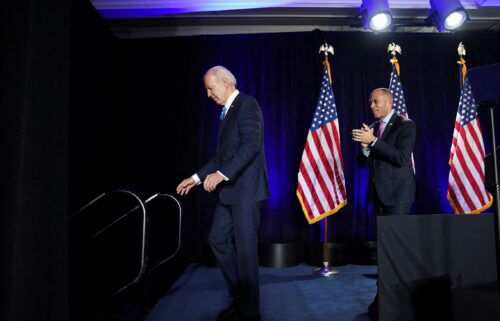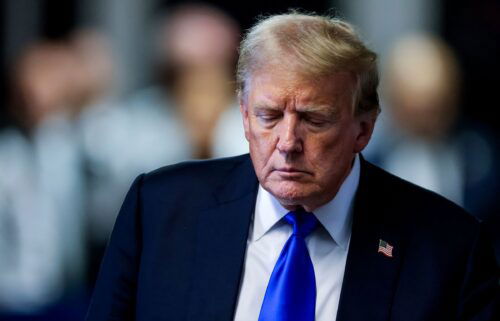The 5 top 2020 stories you need to know this week

With 92 days until the Iowa caucuses and a record number of Democratic candidates, the 2020 election is already in full swing. Every Sunday, outline the 5 BIG storylines you need to know to understand the upcoming week on the campaign trail. And they’re ranked — so the No. 1 story is the most important of the coming week.
5. Andrew Yang is still underrated: If I told you six months ago that former Texas Rep. Beto O’Rourke would drop out of the 2020 race before Andrew Yang — and that that decision would make total and complete sense to any objective observer — you would have laughed. And rightly so.
But here we are. Yang, the technologist who has based his entire campaign on the dangers of automation and the idea of giving every American 18 years of age or older $1,000 a month for their entire lives, continues to gain strength — in terms of polling and fundraising — even as better-established candidates, like O’Rourke, are dropping from the race amid slackening support.
He has nearly quadrupled his campaign staff over the past three months. He’s opened 10 field offices in early states in just the last month. He’s hired on Tad Devine and Julian Mulvey, the media consultants behind Bernie Sanders’ 2016 campaign, to help shape his image. And he continues to be the candidate having the most fun on the campaign trail. Over the weekend, Yang hosted “Yangapolooza!” in downtown Des Moines, joining Weezer’s Rivers Cuomo on stage to sing “Say It Ain’t So.”
The playfulness of Yang (and his campaign) may be why he still isn’t being taken as seriously as his growth in the race suggests he should be. Yang is still seen as a sort of fun afterthought in the race. While he isn’t a top-tier candidate in the race as of yet, his fundraising, staffing and trend line all suggest he is very much moving into the second tier even as many of his better-known rivals fade away entirely.
Is Yang going to be the nominee? I don’t think so. But I do think he is on a track to be in the race — and a factor in it — for months to come. Which is a huge win for him (and the rest of the Yang Gang).
4. Who has to win New Hampshire?: The filing deadline for 2020 candidates in New Hampshire is this Friday. So who’s ahead — and who needs to win the state to keep their presidential dreams alive?
At the moment, Massachusetts Sen. Elizabeth Warren looks like the Granite State front-runner. She’s ahead of former Vice President Joe Biden by 4 points and Vermont Sen. Bernie Sanders by 5, according to the RealClearPolitics average of polls in the state. No one else gets double-digits, with South Bend Mayor Pete Buttigieg the closest with nearly 9% support.
So who has to win the state? Some of that, of course, depends on what happens in Iowa. If you assume either Warren or Buttigieg wins Iowa — much more on that below — then New Hampshire turns into an absolute must-win for Sanders. Sanders won New Hampshire overwhelmingly over Hillary Clinton in 2016, and if he’s not able to replicate that success four years later with a much more divided field, it could be curtains.
Biden, also, will have considerable pressure on him to overperform expectations in New Hampshire if he doesn’t win Iowa (and it doesn’t look like he will at the moment). Biden has held the front-runner role for the entirety of the race — even though there are clear signs (early state polls, fundraising) of weakening. If the titular front-runner can’t win in either of the first two voting states, then can that person really be considered the front-runner anymore?
3. The Kamala collapse: For months, it’s been clear that California Sen. Kamala Harris has lost her way in the 2020 race. Following a shining moment in the first Democratic debate in the early summer. She’s looked lost — caught between trying to appeal to the most liberal wing of the party and preserving some centrist qualities that she believed would keep her viable in a general election.
Late last week, the hard reality of Harris’ disappointing campaign hit home — as she closed several of her offices in New Hampshire and fired all of her field organizers in the state. Harris’ decision to give up on New Hampshire — make no mistake, that is what she is doing — feels less like a going-all-in-on-Iowa than it does an attempt to put a small Band-Aid over a gaping wound.
Harris’ poll numbers in Iowa, New Hampshire and beyond are in the low single-digits. She has struggled to raise the sort of money the top competitors — sans Joe Biden — have done. And that was before last week where her campaign acknowledged the deep peril her candidacy is in. Considering all of that, the big question surrounding Harris is not whether she can make a comeback. It’s when will she drop out and, relatedly, whether she will endorse any of her rivals.
2. Iowa has a new top two: The combination of a new New York Times poll in Iowa and this weekend’s cattle call of 2020 candidates at the state party’s big annual fundraiser have made one thing clear with 92 days left before the caucuses: The two candidates to beat are Massachusetts Sen. Elizabeth Warren and South Bend Mayor Pete Buttigieg.
The Times poll, which was conducted in conjunction with Siena College, showed Warren at 22% with Vermont Sen. Bernie Sanders at 19%, Buttigieg at 18% and former Vice President Joe Biden at 17%. While that suggest the field is closely clumped, both Warren and Buttigieg have been trending upward in the state for months while Sanders has, generally, held steady and Biden had faded.
Then there was the the Iowa Democratic Party’s Liberty and Justice Celebration on Friday night — where Warren and Buttigieg shined, both in terms of their organizations and the candidates’ performances.
“On Friday, Massachusetts Sen. Elizabeth Warren and South Bend, Indiana, Mayor Pete Buttigieg showed why they’ve been steadily rising in the polls, bringing the most supporters and delivering the clearest arguments of the night,” wrote CNN’s Eric Bradner.
There is, of course, time for the current trajectories of the candidates to change. But momentum matters in politics — and especially in a state like Iowa that gets so much attention from candidates and coverage from the media. And at the moment, Iowa looks like a two-person race between Warren and Buttigieg.
1. 365 days and counting…: In exactly one year’s time, voters will head to the polls to decide whether or not President Donald Trump deserves a second term. So how do things look for the incumbent right now?
By most historical measures, not so good. Trump’s job approval rating has never been over 50% in Gallup tracking polls, a first for a sitting president. Gallup’s latest poll in mid-October showed Trump’s job approval at just 39% compared to 57% who disapprove. (It’s possible that the death of ISIS leader Abu Bakr al-Baghdadi has given Trump a bit of a bump since that poll.) And the number of people who strongly disapprove heavily outstrips those who strongly approve of Trump.
In hypothetical general election matchups, Trump trails all the most likely Democratic nominees, according to the Real Clear Politics polling averages. Biden has a nearly 9-point edge, while Warren leads by 5, Sanders by 6 and Buttigieg by 3. That national polling is also generally consistent with swing state data — particularly in upper Midwest states like Wisconsin and Michigan where Trump won in 2016.
The silver lining amid all this potential doom and gloom for the President continues to be the economy. The October jobs report was stronger than expected with unemployment at 3.6% and 128,000 jobs created last month. Trump continues to get his best poll ratings when it comes to his handling of the economy. Given that, it’s no surprise that the economy was front and center in his new national ad first unveiled during the World Series.
The one big unknown in all of this, of course, is who the Democratic nominee will be. Concern is mounting that Warren might be too liberal and too easily caricatured by Trump. But that remains to be seen. Still, it’s worth remembering that Trump will face off against a specific Democrat with unique strengths and weaknesses — not a generic Democratic ideal.
CORRECTION: This story has been updated to reflect Yang’s monthly dividend plan.



